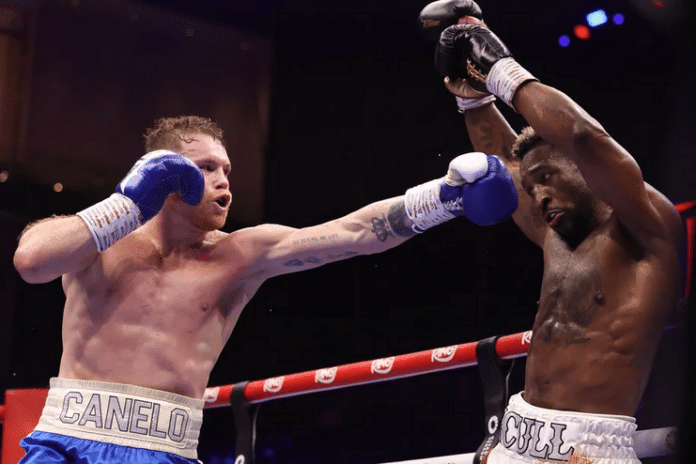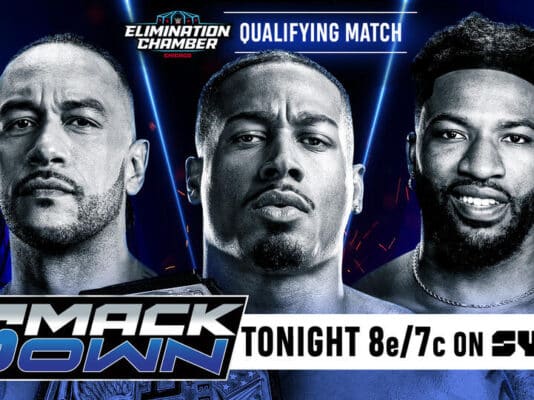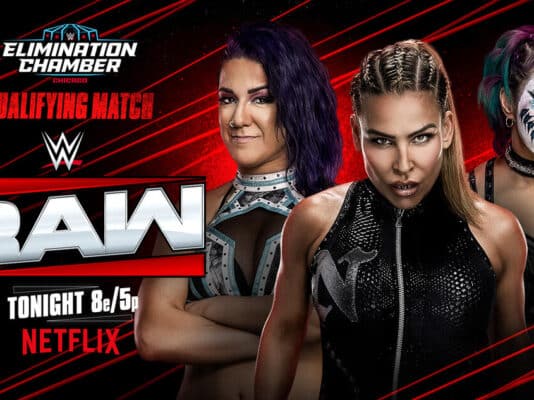
Professional boxing has been bought and paid for.
Of course, that’s not breaking news since there were suggestions of that notion over the years and even occasional Senate hearings on the matter. However, make no mistake about it, pro boxing, one of the staples of American sports history, was purchased by big money, which will essentially eliminate the top fights from the United States in the future.
In some ways, this is almost a fitting status for the sport, and more specifically, its promoters that allowed political red tape to destroy the opportunities for major fights from being signed in the mid-2000s. Floyd Mayweather’s glorified exhibitions, a lack of regular distribution, and a lackluster heavyweight division disenfranchised the American public with boxing.
There was a reason that a sideshow fight like 60-year-old Mike Tyson vs. Jake Paul had the chance to get draw a major crowd and mainstream notoriety.
The bottom line is, if the best fighters within each weight class had the chance to compete against each other, which was the case for boxing when the sport drew its biggest money, there would still be an audience for it today.
There was no better example of how professional boxing was bought and sold than last weekend’s Saul “Canelo” Alvarez vs. William Scull fight, a super middleweight bout held in Riyadh, Saudi Arabia as a part of Riyadh season.
This was the first bout of a four-fight contract that Mexican superstar Canelo Alvarez signed with the Saudi government, a deal worth an estimated $400 million for him to compete in the country. While the pound-for-pound discussion can be a debate, there’s no doubt that Alvarez is the top star in the sport.
Perhaps, that’s why it’s so disappointing for him to fight as a part of a propaganda tour, a Saudi government strategy that has seen the country spend billions of dollars in oil money to import outside sports and entertainment acts to the country to attempt to seem more modern, despite continued criticism around human rights violations. As we know, the WWE’s most profitable events over the past several years were the Saudi events because the government is willing to pay $40 million for the company to run events in the region. The Royal Rumble is scheduled to be there next year. For the Canelo fight, the in-door venue seemed to have a smaller crowd given the restrictions of the building for one of the trademarks of Canelo’s career, fighting on Cinco De Mayo weekend. Just four years ago, when he fought Billy Joe Saunders on the same weekend, the fight drew over 70,000 fans at AT&T Stadium.
His opponent, Cuban fighter, William Scull was actually selected as a mandatory opponent by the IBF in 2022, but Alvarez declined the bout, causing him to be stripped of the IBF Super Middleweight title, which means nothing in the grand scheme of things because of the alphabet soup collection of belts and sanctioning organizations that are just looking to get their piece of the pie rather than promote competition.
The reason Canelo declined the fight three years ago was that Scull was a complete unknown and thus the fight wouldn’t generate the same amount of revenue as a known contender. Three years later, Scull was still unknown, but the difference was that since the Saudis were paying Alvarez a guaranteed $100 million for the bout, the opponent didn’t impact the economics either way.
During the introductions, I saw exactly why Scull was unknown and why this fight wouldn’t be competitive. The eight-year pro had an undefeated record of 23-0 with just nine knockouts and the rest of his victories via decision. With only nine KOs, Scull wouldn’t have the power to hurt Canelo or slow down his push forward style. Furthermore, Scull went to distance more often than not, which would allow Alvarez to grind down his opponent with his signature body punches.
In short, there was nothing about this contest that would suggest that Scull any realistic chance to even be competitive, let alone win the bout. He didn’t have the power, the experience, or the skill to be anywhere near any of the top level fighters in the sport.
The one thing that Scull did have when he went to the ring in Riyadh was cardio. I’m not sure he has any business trying to be an elite boxer, but he should enter a triathlon because he was on his bicycle to backpedal and run for more or less the entire 12-round fight. This fight became visual NyQuil, as Canelo would press forward, Scull would back up, Alvarez would cut part of the ring off, and then Scull would ran away rather than exchange any punches. Scull’s jabs were thrown without any intention of landing, and the lopsided stats showed that Canelo was exponentially more accurate, landing more punches than Scull, despite throwing far less during the course of the contest.
It became clear in the first few rounds that Scull wasn’t there to win, but rather just to collect the $3 million purse from the Saudis and get a moral victory to be able to claim that he went the distance with boxing’s top star. It might sound trivial, but Scull just wouldn’t attempt to exchange any punches or even throw any serious punches so Alvarez would land a ripping body shot before Scull would scurry away. In some ways, there was nothing Canelo could realistically do to attempt to push the fight, as he was controlling the pace and landing more efficiently, but unless he was willing to fight foolishly with wild hooks, which a professional of his caliber isn’t going to do, how was he supposed to fight Scull?
It’s not Canelo’s responsibility to fight foolishly and risk a potential fluke punch from his opponent landing just to try to get to the point where Scull was willing to actually fight. At one point in the ninth round, even the referee tried to tell Scull to fight rather than run. Alvarez won a unanimous decision. One judge had the bout a much closer 115-113 for Alvarez, and I’m not sure what fight that guy was watching, but given the total lack of action, I wouldn’t be surprised if he fell asleep at ringside. Alvarez won every round, but the contest was so lackluster and boring that there weren’t really any winners in this fight.
Post-fight, plans for Canelo’s next signature of his career, fighting on Mexican independence day in September, were announced. Terrance Crawford, who many consider the pound-for-pound best fighter in the sport, will be Alvarez’s next opponent.
In theory, the best pound-for-pound fighter against the biggest star in boxing should be a massive deal, but can anyone realistically be excited for Canelo’s next bout after this snooze fest? That’s not to say that it was Canelo’s fault, but he was the A-side of pay-per-view that cost $59.99 and it was a total flop. Could the fans realistically be excited to pay another $59.99 in a few months for any boxing pay-per-view? Don’t get me wrong, Crawford is a brilliant undefeated fighter, and the Canelo/Crawford fight should be a classic, but a comically boring bout with Scull jogging for 36 minutes doesn’t help the sport.
The bigger issue is that such a mega fight won’t be held in a historic location like Las Vegas or Madison Square Garden. It won’t be at a stadium in Texas or maybe a stadium in the UK in front of the wildly enthusiastic European fans. It’s going to be in front of a relatively small crowd because the Saudis have taken several times to attempt to monopolize certain entertainment acts from North America. Quite simply, they can offer more money than anyone else can realistically bring to the table because the Saudis don’t promote these events to make a profit, it’s simply a propaganda campaign. As I’ve written since the WWE inked a deal to bring events to Saudi Arabia, there’s just something sleazy about oil money being used to try to spin the narrative for a country that has rightfully been criticized for human rights violations. But, they important the WWE, the UFC, they have the LIV, a pro golf league that had enough money behind it that it almost merged with the PGA before the deal collapsed, and they were able to add Canelo to the list of boxers that compete in the country.
Don’t get me wrong, I’m not criticizing Alvarez or any other individual athlete for taking the money on the table, these are numbers that it’s almost impossible to refuse, but let’s be clear, the TKO corporation doesn’t have to take the Saudi money, they just want to pad the profit margin. Sure, it’s strictly business, but it’s undoubtedly the propaganda business.
What do you think? Share your thoughts, opinions, feedback, and anything else that was raised on Twitter @PWMania and Facebook.com/PWMania.
Until next week
-Jim LaMotta
E mail [email protected] | You can follow me on Instagram, Facebook, & Threads @jimlamotta89












